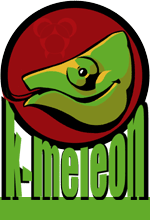K-Meleon
KMeleonWiki > Documentation > Tutorials > GREUpdate
Note: As of SeaMonkey version 2.0, Mozilla replaced the Gecko Runtime Environment (GRE) with XULRunner. No recent versions of K-Meleon use the GRE. If you need help updating K-Meleon, refer to the InstallationGuide or post in the forums for additional support.
This tutorial is an update of this old tutorial.
-English- -Español?-
Update K-Meleon To Use Seamonkey's Latest GRE
Mozilla Foundation release new versions of its GRE(Gecko Runtime Environment) and new versions of their browser products which fix newly found security holes. As K-Meleon v1.x is based on the v1.8.1.x GRE and does not get updated often, the following tutorial will explain two methods of updating K-Meleon v1.x to a new GRE for those who seek better security.

The Quick & Easy Way
Brielle Bruns, Fred and desga2 (and others forum friends) has provided those users who are less experienced, less inclined to experiment, or who are time-limited, a downloadable package which contains only the bare essential files needed to update K-Meleon v1.x to use the latest Gecko. Using his package apparently eliminates some visual glitches with K-Meleon which may arise from using the manual updating method, and also eliminates the need to delete the extra *.dat files from the components folder for Gecko update to work (the installer takes care of it all for you).
To install just download the latest Gecko 1.8.1.21 (Seamonkey 1.1.16) update patch to All versions. (Installer version 4.1 Mb)
(This exe installer patch can be uncompress with 7zip if you don't like installer but remember delete *.dat files and rename (the extension file to .bak) or deleted embed_lite.dll file (if it exist) in \components when you update files)

The Do It Yourself Way
This method assumes the user is familiar with the copying of files and folders and is willing to experiment a little to make things work.
1. Download the zip version of the latest stable Seamonkey (Zipfile in Official Builds), or alternatively download a win32 zip version of the latest Seamonkey nightly build.
2. Unzip the zip file, usually right-clicking on the file and selecting "Extract" should create a folder with the contents of the zip file.
3. With K-Meleon closed, copy the following files and folders from the Seamonkey directory you have just created into your existing K-Meleon directory (usually C:\Program Files\K-Meleon) and, when prompted have existing files overwritten:
IMPORTANT NOTE: There are two files that mustn't be overwrited to update 1.x versions; chrome.dll and chrome.xpt. This is because chrome format in 1.x version is diferent to Seamonkey/K-M 1.0.2 versions chrome format. If you overwritted this files K-Meleon will crashed to start or no web page will be loaded (only a blank page will be showed).
UPDATED to K-Meleon 1.5.x: In before Seamonkey versions to 1.1.15 xpcom_core.dll file wasn't compatible with K-Meleon. And for compatibility was not recomemded update xpcom*.dll files. (xpcom_core.dll, xpcom_compat.dll and xpcom.dll in K-Meleon main folder)
But in actual Seamonkey version 1.1.16 xpcom files are compatible with K-Meleon and can be updated.
Folders:
Files:
- All *.dll files in the main directory (where seamonkey.exe resides). This is the quick and easy path for updating, a better alternative would be to just copy the same files that can be found in the K-Meleon directory. This can be accomplished with "xcopy", i.e.; xcopy C:\Seamonkey\*.* %programfiles%\K-Meleon\ /U /Q /Y
Once you have copied the folders and files across, go to the K-Meleon\components folder, and delete (don't worry this files will be generated automatically in next K-Meleon start) compreg.dat and xpti.dat and rename (the extension file to .bak) or deleted embed_lite.dll file (if it exist because isn't needed and can cause problems). You need to do this in order for the Gecko update to work correctly.
4. Start K-Meleon. Help -> About K-Meleon should now report a newer Seamonkey Gecko version in user agent string, i.e.; Mozilla/5.0 (Windows; U; Windows NT 5.0; en-US; rv:1.8.1.13) Gecko/20080313 K-Meleon/1.1.4.

Share your Gecko update
After you test your Gecko update and if this work properly you can share it with K-Meleon comunity make an install with needed files updated and upload to your web server or any storage online server and post it in K-Meleon Forum.
Here you have an example tree of folders and files needed to K-M 1.1.x version Gecko update. You can package this update in a compress file (zip, 7z, rar, ...) (Users of this updates must remmember to delete compreg.dat and xpti.dat files and rename (the extension file to .bak) or deleted embed_lite.dll file (if it exist) in \components subfolder) or in an executable installer.
This is an example code to generate a simple installer to Gecko update with NSIS 2.x. Also is recommended to use HM NIS EDIT to edit and compile .nsi files easily. Save next code in a file named kmGecko_up181_13.nsi (for example).
; NSIS Script For K-Meleon Gecko 1.8.1.x update
; Based on Installer v4.33p6 by Brielle Bruns and Extension Setup 1.9 by Alain
; Modified by desga2
!define PRODUCT_NAME "K-Meleon 1.1.x-Gecko rv:1.8.1.13 date:20080313"
!define PRODUCT_VERSION "1.0"
!define PRODUCT_PUBLISHER "desga2" ; Your name here
!define PRODUCT_WEB_SITE "http://two.xthost.info/kmeleon/" ; Your web site here
;Do A CRC Check
CRCCheck On
SetCompressor /SOLID lzma
SetDatablockOptimize on
ShowInstDetails show
SetOverwrite on
AutoCloseWindow false
; Name and output file
Name "${PRODUCT_NAME}"
Caption "K-Meleon Unofficial Gecko Updater" ; Window title
BrandingText /TRIMCENTER "by desga2" ; Author
OutFile "kmeleon11x-gecko18113-update.exe" ; Output exe file name
; Default installation folder
InstallDir "$PROGRAMFILES\K-Meleon\"
; Get installation folder from registry if available
InstallDirRegKey HKEY_CURRENT_USER "Software\K-Meleon\General" "InstallDir"
;The Default Installation Directory
;InstallDir "C:\program files\k-meleon"
;The text to prompt the user to enter a directory
DirText "You must close all K-Meleon instances and the loader before to continue.$\nPlease select the K-Meleon folder below you wish to install this UNOFFICIAL Gecko engine update to:$\n${PRODUCT_NAME}"
Page directory
Page instfiles
Section "GeckoUpdate"
;Install Files
SetOutPath $INSTDIR
File /r "K-Meleon\*.*"
Delete /REBOOTOK "$INSTDIR\components\compreg.dat"
Delete /REBOOTOK "$INSTDIR\components\xpti.dat"
SectionEnd

 English
English